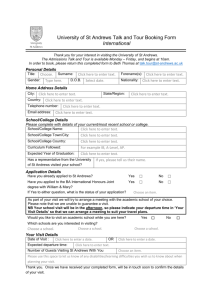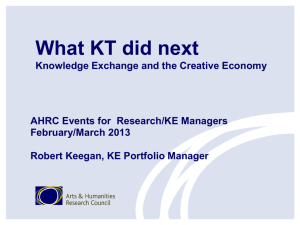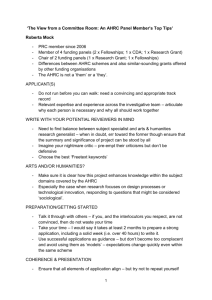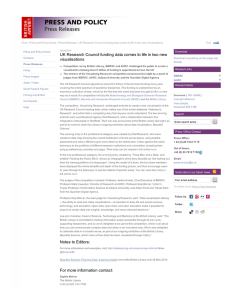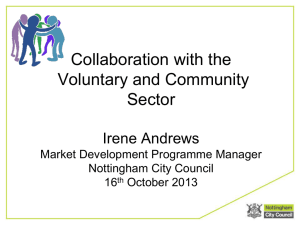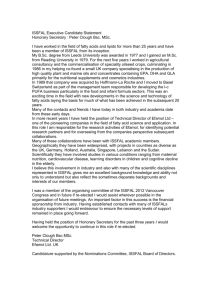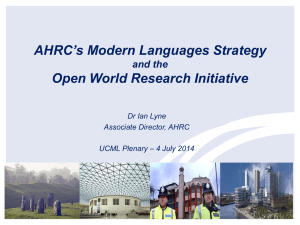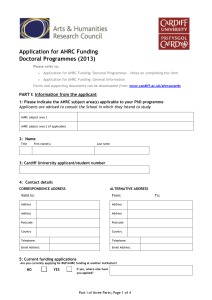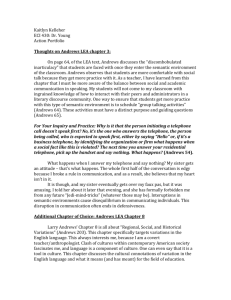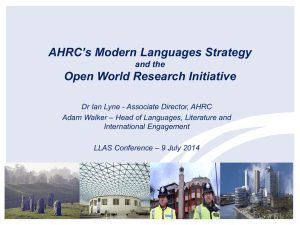Research Computing - University of St Andrews
advertisement
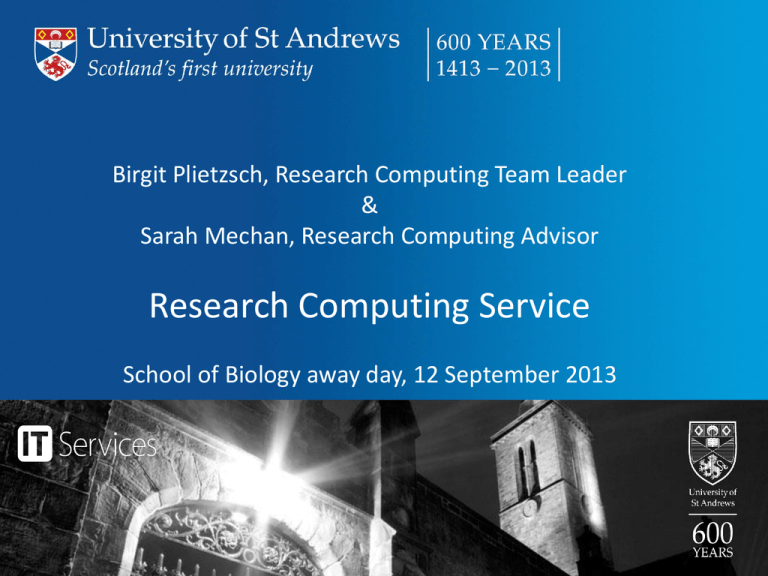
Birgit Plietzsch, Research Computing Team Leader & Sarah Mechan, Research Computing Advisor Research Computing Service School of Biology away day, 12 September 2013 Contexts for the service Vision To provide innovative and advanced digital technologies and research computing services of nationally and internationally recognised quality and standards, which will facilitate research excellence at the University of St Andrews. (Research Computing Strategy, http://www.st-andrews.ac.uk/itsupport/academic/research/about/strategy/ ) Internal External University, ICT, RC Strategies Funder requirements RDM Roadmap Academic workflows that require openness, transparency, (where necessary) longevity The team Dr Birgit Plietzsch Research Computing Team Leader 2003 Swithun Crowe Applications Developer (Research Computing) 2004 Sarah Mechan Research Computing Advisor 2013 Athos Georgiou Applications Developer (Research Computing) 2013 MA British and American Studies, Business Studies and Russian Martin Luther University HalleWittenberg, Germany MA Philosophy University of St Andrews BSc Biotechnology MSc Bioinformatics PG Information Technology University of Abertay Dundee BSc Computer Science BSc Maths University of Louisiana at Monroe Dr phil. British Cultural Studies Martin Luther University HalleWittenberg, Germany MSc Information Technology Herriot Watt University PG Statistics Trinity College Dublin MSc Computer Science DePaul University, Chicago RC service provision Liaison services Advice Development services Research projects Research Research Computing Computing Service Infrastructure projects Liaison services Bridging the gap between different cultures and mind sets: • • • • research community and IT specialists in central services different professional language, expectations and working practises management of a research project usually requires a different, iterative methodology than a corporate IT infrastructure project having a more clearly pre-determined end point Leveraging expertise within and external to the organisation (coordinate ‘specialists’) Research projects New project Service perspective (pre-) application stage • Development of ideas Technical requirements gathering (software, hardware, technical development and data requirements) • Planning the Research Computing Service • Cost recovery • Confirmation of requirements Project stage Postproject stage • • • • Technical development work Storage and backup Enabling access & sharing Training • Hosting of research outcomes enabling access & sharing enabling use & re-use • Technical maintenance • [long-term preservation] Research projects Funder perspective Quality of applications • “This is an exceptionally well written proposal, setting out its general goals with clarity. The applicant gives confidence at every level, presenting few issues for thought or clarification. The digital outcomes are well defined, and supported by relevant resources and management. This is likely to produce a very successful resource, with usefulness to scholars and the general public alike.” Technical support / skill available to the project team • “The IT people will be very important in this project, and I don't know them, but certainly the on-line databases provided by St Andrews which I have used are reliable both technically and intellectually. It seems safe to assume, therefore, that this side of things will also be successful.” Institutional commitment / sustainability of project outcomes • “It is good to see the technical work being carried out in the context of an institutional commitment to the digital humanities, as evidenced by the University's Arts Research and Teaching Server and the support of the university's Research Computing Team.” Research projects Our expertise I am writing on behalf of the AHRC to thank you for your outstanding contribution to the work of the Council over the past year. … We continually monitor the contribution made by College members. This is not only to maintain the quality standards of peer reviews, but also to identify College Members who have made a particularly significant and valuable contribution to our activities. … [W]e feel that your contribution is worthy of special praise. (Prof. Mark Llewellyn, AHRC Director of Research) Research projects Researcher perspective “I can affirm without hesitation that the support that you have provided at a range of levels has been by far the most valuable that has been available to me.” “I can’t tell you how grateful I am to you and Swithun for your continued support for this project. In fact I was thinking about it yesterday and really you have helped make it a much better project.” “I have found integrating images with text a very stimulating process which is greatly helping the research element of the project and my own traditional publications (forcing me to think things through in order to explain them clearly to the target audience!).” Research projects: Current involvement Funded projects: • A Corpus of Scottish Medieval Parish Churches – £487k, Art History, AHRC • The Islamisation of Anatolia, c.1100-1500 – €1.3m, History, ERC • Language-Philology-Culture: Arab Cultural Semantics in Transition – €1.5m, Modern Languages, ERC • Victorian Science Spectacular – £28k, History, ARHC • Publishing the Philosophical Transactions: the social, cultural and economic history of a learned journal, 1665-2015 – £800k, History, AHRC • Defining and Identifying Middle Eastern Christian Communities in Europe – £250k, International Relations, HERA • Scientists in Congregations – £800k, Divinity, John Templeton Foundation Formative Questions: • Data Quality? • Metadata standards? • Long-term repository? • Audience? Research life cycle Funder Requirements Responsibilities: • Metadata • Data Formats • Data Cleaning • Confidentiality • Archiving • Retrieval Tools: • Data Standards • Masking • Data Synthesis Agents • Ethics Protocols • Storage Protocols System Triggers: • Data Acquisition • Restrictions • Multiple Data Streams • Collaborations • Linkages to other Data Life Cycles Hypothesise Data Collection Data Re-use Data Analysis & Sharing DATA Electronic Resources Data Publishing & Archiving Systematic Storage of Outcomes Hartter et al. (2013) PLoS Biol 11(9): e1001634. doi:10.1371/journal.pbio.1001634 Data Processing Data Discovery Systematic Data Storage Innovative ICT to enhance Research discovery Any questions ? research-computing@st-andrews.ac.uk Attribute University of St Andrews, images on slides 5, 9 & 10: www.digitalbevaring.dk

